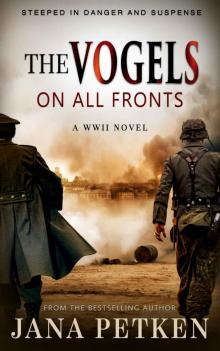- Home
- Jana Petken
The German Half-Bloods (The Half-Bloods Trilogy Book 1) Page 14
The German Half-Bloods (The Half-Bloods Trilogy Book 1) Read online
Page 14
“It’s more secure,” answered the squad leader.
Franz said, “It’s designed to keep the Jews from trying to escape once we’re on the road. Get a move on, Vogel. We’ll be late if we don’t get going.”
Wilmot took the manifest, and as he read the names and ethnicities, he noted that everyone inside the truck was Jewish. That was rare; usually a few Polish dissidents, gypsies, Resistance nuisances and the like, were in the mix.
He walked slowly around the truck, frowning. It had no windows or air vents, how were the Jews supposed to breath when the back door was closed? Ach, it was only a short journey to the other camp. They’d be all right.
Before setting off, he and Franz inspected their passengers. The squad leader told them to physically check for a second time that all the people in the back were Jews and that no mistakes had been made. He was not interested in what region or country they’d come from, only that they were Jewish. Wilmot also thought this strange, but it wasn’t his place to question his superior. Loyalty, always remember loyalty, he reminded himself every morning.
The inside of the truck was also lined with metal, but a wooden grill covered the floor. As usual, the small space was cramped with barely enough room for the number of people it held. “No sitting room again today, I see,” Wilmot remarked. “I’d rather do two journeys with fewer people in the back.”
“Why do you care about their comfort?” Franz asked.
“I don’t. I care that I might have to clean up the mess some of them make. The old ones get sick when they stand the whole way, and some of them piss themselves. Next time, you do the cleaning. See how you like getting your hands dirty.”
“No, no, Vogel, don’t try to pass the buck. It’s your truck and your responsibility.”
Wilmot closed the door and remarked again to Franz, “Isn’t this metal business going a bit overboard?”
“Why do you always have to ask questions?” The squad leader interrupted. “That’s all you ever do, Vogel. Oh, where are the prisoners going? What will happen to them when they get to wherever it is. Oh, I hate not knowing.” Wilmot’s superior mimicked his constant nit-picking about the prisoners’ well-being. “Just get in the truck and drive.”
Wilmot turned on the ignition and drove out of the camp. As per his directive, he headed towards the large holding camp situated about fifteen kilometres to the west of his base. His headache was subsiding, but he was still a bit groggy and not in the mood for conversation with Franz who liked to talk about how many Poles he’d killed during the invasion, as though he’d been the only bloody person to fire his gun.
After about twenty minutes, Franz said, “Pull over, Willie. I need to pee. Keep the engine running and get out.”
“Why?”
Once the truck had stopped at the side of the road, Franz opened his door and jumped down. “Just do it, Willie. I have to tell you something, and when I do you need to keep your trap shut and follow my instructions.”
Out of curiosity, Wilmot got out of the truck and walked behind Franz to a tree at the other side of the road. It was light now, but rain was coming down in sheets and the landscape was gloomy.
The two men put their helmets on and stood underneath the leafless tree. “This is a bloody stupid idea, Franz. I’m getting bombarded with giant raindrops dripping from the branches. We’re getting wetter here than we would have if we’d stayed out in the open.”
Franz told Wilmot to stay where he was before going to a bush to empty his bladder. When he came back, he tried to light a cigarette with his Zippo lighter, but the cigarette wilted in the rain and the Zippo refused to spark.
“Hurry up for Christ’s sake,” Wilmot said. “Look at the state of me.”
“We need to wait fifteen minutes.”
“Why?”
Franz looked at the truck. “Follow me. I’ll show you.”
Franz got down on his knees to look under the truck and motioned Wilmot to follow suit.
“Do you see where that exhaust pipe is going?” Franz asked.
“Yes – so?”
“Well, it’s connected to the inside of the truck where the Jews are, and while the motor’s running all the toxic air from the pipe is seeping into the Jews’ lungs. In about five minutes they’ll all be dead. Anyway, that’s the result the officers are hoping for. They’ve only tried this gassing method a couple of times, and a Standartenführer and a doctor will be along shortly to see if it worked. We’ve to wait until they get here before opening the back or cutting the engine.”
Wilmot sucked in his breath, leapt to his feet and then ran to the truck’s back door. Not thinking about the field commander who was on his way, or about anything except getting fresh air into the Jews, he failed to see Franz come up behind him. Franz grabbed Wilmot by the back of his jacket. Wilmot stumbled backwards into Franz. Both men fell to the ground, Wilmot on top of Franz, who let out an almighty whoosh as his lungs emptied.
Wilmot, struggling off Franz, muttered, “Why are you doing this?”
One of Franz’s hands gripped Wilmot by the ankle in a bid to restrain him. The two men wrestled. Wilmot was on the ground again, this time trying to crawl away from Franz, kicking the latter’s face with his free foot until Franz let go. He held his hand over his bloody nose and burbled, “Turn off the bloody engine before you open that door.”
Franz got to his feet. “Do it, Willie. I’m telling you for your own good.”
About twenty minutes had passed since Wilmot had stopped the truck and followed Franz’s instructions. He switched off the ignition and then ran to the truck’s back door, knowing now that Franz had been right about the exhaust fumes. Then, just before he opened it, he inhaled and held his breath.
When he swung open the doors, he retreated to a safe distance. The bodies of those who had been loaded onto the truck last, fell out, landing on top of each other on the muddy ground with sickening thuds. Everyone else lay in a messy heap inside. Wilmot stared, horrified, at the red-tinged skin on peaceful faces no longer cognisant of the monstrous crime perpetrated against them. Then he turned to face Franz, drenched with rain and standing an even greater distance away. “You should have told me. You should have told me, Franz – I thought we were mates.”
“I know you, Willie. You wouldn’t have done it. We’d have both been on a charge, and I’m not getting reprimanded for your bloody insubordination. Why don’t you, just for once, follow orders?”
Wilmot, enraged, lunged at Franz, not only because of what he’d done to the Jews but also for his treachery. His failure to show a modicum of empathy for the people they’d just killed, disgusted him. Even now, Franz’s face held a contemptuous smirk, like the devil’s approval of a sin well performed.
Wilmot hit Franz hard on his already bloodied nose.
Franz stumbled, fell, but got back up and began his own tirade of punches, first in Wilmot’s stomach and then in his face.
Franz screeched, “I’m reporting you, Vogel! You tried to save those Jews, and that’s treason – loyalty until death – that’s our motto, and you broke it! You’re a simpering old woman!”
Wilmot, still doubled over in pain, gazed again at the bodies. Behind him, Franz’s mocking laughter bludgeoned his ears. With breath finally filling his lungs, he shouted back. “You’re a cold-hearted bastard, Franz Bachmeier!”
Franz laughed again, louder and harder this time. “I can’t wait to tell everyone about you wriggling on your belly, trying to get that door open to save a load of useless Kikes. I suppose you’ll want to find a place to have a good weep. You’re a soppy girl, Vogel. You don’t deserve to be in the SS. Wait ‘til I tell the lads in the dormitory about you crawling on your knees crying for Jews!”
Wilmot, no longer thinking of anything but revenge, unclipped his side holster, drew his pistol, pivoted and fired at Franz, just as a jeep arrived, carrying the Standartenführer and two SS doctors.
Wilmot heard a second vehicle pull up, and shortly after, roug
h voices coming up behind him. He wanted to turn around, but instead, sank to his knees and put his hands behind his head in the same way the Polish prisoners had when they’d surrendered. He was going to be shot for this. Jesus Christ, his temper had got the better of him. He could hardly recall even going for his gun.
Within seconds, his fellow SS soldiers were running towards Franz, lying motionless on the ground. Wilmot was dragged to his feet. He called out to the SS men who were bending over the shot man, “Is he alive?”
Then, without getting an answer, he was marched to the jeep. As he passed the pile of dead Jews he knew that the image of their execution would be seared into his mind for the rest of his natural life. He shook his head, tears beginning to well in his eyes as they fixed upon a child with its hand over its mouth, as though yawning into death. He wondered how many more such murders were to come. “I didn’t enlist for this … this is not why I joined the SS … do you hear me? This is not why I signed up!”
Chapter Nineteen
Max Vogel
Paris, France, June 1940
Baptiste Chirac, the owner of the photographic shop on Rue Lepic, sat in an armchair in his back office discussing the handover of his business to Romek, Klara and Max. This was Max’s second visit to Paris in as many months, but it had been necessary due to Chirac’s ailing health. He’d been MI6’s bulwark in Paris for a number of years and was highly regarded by British Intelligence. Now, in the sunset of his life, he found the pace too quick and his brain too slow to keep up with the steady flow of information that the London based headquarters required.
“I’m too old to learn new tricks,” Chirac told the others. “These radios you have, and the codes needed to transmit securely are too much for my old brain. At times, I can’t even remember what happened yesterday, never mind how to decipher letters and numbers in a book.”
“You’ve taught Klara and me well, Monsieur Chirac,” said Romek. “I have decided to hand this side of the business over to Klara. She can run it while I see to other things. We also think it’s best not to tell anyone about her involvement here, or that we’re even married. The only person who knows about her, other than us three, is Darek, the Pole, who’ll be our courier.
“Wait, Romek,” Max said, raising his hand. “Before you both jump into this with both feet, you need to think about the possible consequences.”
“I have … we both have,” Klara answered.
“We won’t be able to live together as man and wife for the foreseeable future, but that’s a price we’re both willing to pay.” Romek said. “You know her, Max. She’s stubborn, and she’s also right about me not being suitable for this job. She speaks French like a native, whereas mine is rusty. I’d put both of us in danger if I stayed here. She’s got to do this alone.”
“How will you keep in touch?”
“I’ll find us a secret location where we can meet once a week. She can hand over her intelligence to me or Darek, and, if there is an emergency, she can use Darek to find me.”
Klara added, “You must see we’re right about this, Max.”
Max looked at Klara and then Romek. “All right, I agree on principle, but if the Germans occupy Paris, you might both have to go underground.
“They won’t get in,” Chirac barked.
“Baptiste, I hope they don’t,” Max responded. “But the German armies have already opened a 60-mile wide breach in the Maginot Line at Sedan; that’s 93 kilometres of road they’ve taken. They’ve also bombed the hell out of Rotterdam. They destroyed everything in their path from the air and the ground, and they are marching on Brussels as we speak. Romek doesn’t have much time to organise his recruitment drive and new base.”
“I am organised, almost ready to go,” Romek insisted.
“You’ll need a lot more men if you’re going to put up any sort of Resistance. We’re going to have to recruit Frenchmen who know the area like the back of their hand and speak like Parisians, as Klara does.”
“They will not destroy Paris,” Chirac growled as though he’d just tuned into the discussion again. “The very thought of those Nazis being here makes me want to get out my sabre from storage – no, they’ll not damage a brick in this city. Paris is too big a prize. They’ll base an army here and destroy our lives, perhaps, but not the buildings – n’est-ce pas, Max?”
“Yes, I agree,” Max said, “but the whole point of this meeting is to persuade you to leave Paris. You’re a Jew, Baptiste, and the Nazis will come for you.”
Romek agreed. “They’ll take your shop and then transport you to some godforsaken camp. You must do what Max says and go back to England with him. If you don’t leave, you’ll put us all in danger.”
“That’s enough, Romek,” Max said, annoyed at the Pole’s harsh tone. “Baptiste is one of our best agents. He deserves your respect.”
“Merci, Max, but don’t try to butter me up,” Chirac said. “I am not leaving my country. Let them try to take what’s mine. I’ll shoot any German who so much as sets foot inside these doors. And I’ll tell you another thing, if they try to take me or Madame Chirac by force I’ll shoot her in the head and then I’ll see to myself.”
Max went into the kitchen with Klara. He’d let the other two men debate the merits of escape versus remaining without interfering further. Neither he nor Romek had the right to tell a man to run away from his own country, especially an old soldier like Monsieur Chirac.
Klara poured coffee from the pot into two cups. Max loved the arch of her long neck. He adored kissing it, caressing it with his fingers, parting her generous lips and running his tongue over them. He loved digging his fingers into her blonde, almost white hair. It was playfully curly and shorter than the average woman’s. He loved taking forever to run the palm of his hand up and down her long legs and then moving them onto her flat stomach.
His eyes drifted to her breasts and the narrow waist he’d wrapped his arms around in bed. Had it only been a month since he’d last held her in his arms and made love to her? It seemed more like a year during which he’d ached for her every single day.
She raised her head and met his eyes, sensing that he was watching her. Their betrayal of Romek, a man they both loved and respected, hadn’t dulled their feelings for each other, but it had been hard to live with. A year earlier, when they’d first succumbed to adultery, Max had told himself that making love to Klara had been due to a temporary loss of sanity, loneliness, a desire to feel more than the dread of looming war. But, she was not a passing phase or a simple, yet inexcusable, dalliance. He loved her. God help him, but he did.
Max continued to observe her even as he listened with one ear to Romek trying to persuade Monsieur Chirac to hide behind a new set of identity documents, and to leave Paris for a city where he wasn’t known as the old Jewish photographer. Klara sat down at the kitchen table next to him, close enough for him to feel her hot breath on his face. He closed his eyes for a second to take in her scent; lavender, she always had that glorious aroma on her body. It drove him wild.
“Romek must never find out about us, Max,” she’d told him over a year ago when Romek had been called into work late one night. “He was my childhood sweetheart, and I love him.”
“You love him, but not as you love me, and you know it,” he’d told her.
“What I have with him is enough. I make it enough.”
Max had snapped at her, “Lie to me, but not to yourself. If he were enough for you why can’t we keep our hands off each other? You know you want me, if you didn’t you wouldn’t tell me you dream of us having a life together in the future.” He still regretted his harsh tone which had only made her dig her heels in. She’d seemed so very sad, and only now with the advent of war did he understand why.
“I’ve known Romek all my life. He has always been my hero,” Klara had told him. “I adore him like a sister would an older brother. We’ve never known passion for each other, although, perhaps, I didn’t fully realise that until you came along and
turned my life upside down. When you kiss me, I lose my resolve … but, we have to stop … we have to.”
Although they hadn’t stopped, Max had never been able to defeat Klara’s loyalty to Romek, and he, supposedly an officer and gentleman, should have known better than to take advantage of her on nights when Romek had been working at the German Embassy in Warsaw. Desperate to have her, he’d shoved all thoughts of loyalty to his friend aside. She had been, and still was, like a drug, a forbidden flower in someone else’s garden, a challenge he was determined to overcome.
Her sweet, earnest face with those blue eyes that pierced his heart whenever she looked at him, had been his undoing; he knew that now. “I will not break Romek’s heart, but I won’t give you up either,” he told her often. “A man who doesn’t know passion with his wife doesn’t deserve her. You’re too beautiful, and far too young to turn your back on your husband in bed. You’re worth more, and so is Romek.” Then, they had made love again, forever hungry, never truly achieving the satisfaction that comes from total commitment.
“... do you not agree with me, Max?” asked Romek, arriving suddenly at the kitchen door.
Max, jolted back to the present, prayed for a clue as to what he was about to agree with.
“Well, do you not think Monsieur Chirac should go to Marseille or Toulouse?”
“Oh, yes ... yes, I do,” Max replied. “If that’s the only way to persuade them to leave, then that’s what we’ll arrange.”
On June 3rd, Max took his morning coffee in the Hotel Lutetia’s reception area. He had stayed in this hotel on numerous occasions in the guise of a German businessman who imported watches from Switzerland. He was known to the staff as a fine upstanding man who always tipped well and never queried the bill at the end of his stay. He knew the staff by name and had come to rely upon their discretion.
The hotel was situated on Boulevard Raspail in the Saint-Germain-des-Prés district, close to Monsieur Chirac’s photographic shop. Max had picked up a wealth of information over the last two years from unaware German diplomats, whose embassy was close by. Often, he’d catch a titbit from those who drank their morning coffee with colleagues in the open-air cafés, but it was the high-ranking Germans who held dinner parties in posh restaurants that provided, unwittingly, the biggest haul of intelligence – a German who drank too many glasses of French wine and cognac squawked like a crow, especially when he was surrounded by the French, whom he assumed were too stupid or uneducated to understand his language – their arrogance was their downfall.

 Blood Moon
Blood Moon The Guardian of Secrets and Her Deathly Pact
The Guardian of Secrets and Her Deathly Pact Dark Shadows
Dark Shadows The German Half-Bloods (The Half-Bloods Trilogy Book 1)
The German Half-Bloods (The Half-Bloods Trilogy Book 1) Swearing Allegiance (The Carmody Saga Book 1)
Swearing Allegiance (The Carmody Saga Book 1) The Errant Flock
The Errant Flock The Vogels: On All Fronts (The Half-Bloods Trilogy Book 2)
The Vogels: On All Fronts (The Half-Bloods Trilogy Book 2) The Guardian of Secrets
The Guardian of Secrets Before The Brightest Dawn (The Half-Bloods Trilogy Book 3)
Before The Brightest Dawn (The Half-Bloods Trilogy Book 3) Blood Moon (The Mercy Carver Series Book 2)
Blood Moon (The Mercy Carver Series Book 2) Dark Shadows (The Mercy Carver Series Book 1)
Dark Shadows (The Mercy Carver Series Book 1)